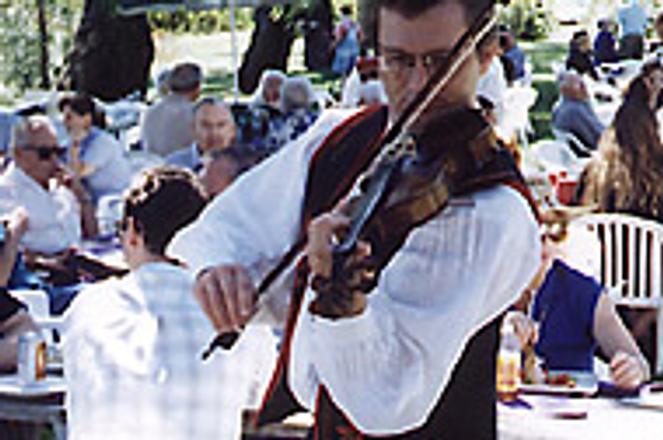The 400 members of the California Czech and Slovak Club meet four times a year.photo: Courtesy of Ilonka Martinka-Torres
Ilonka Martinka-Torres, three-time president of the California Czech and Slovak Club, was born in Chicago, has lived for the better part of four decades in Castro Valley, California, and has a Mexican surname. Not your typical Slovak.
On a recent chilly and rainy January afternoon in California, however, she proffered one very Slovak form of hospitality - hard alcohol. "How about something to drink?" she asked her guests as they nibbled on home-made cake. "I have slivovica, becherovka or borovička."
Her guests called for slivovica, a form of plum brandy that can contain as much as 55% alcohol. While pouring, Martinka-Torres explained that her Slovak grandfather had made the liquor in 1975, buried the bottles in his backyard, then dug one up to bestow on her as a gift during a 1996 visit. She poured the shots, then measured out herself a nip of borovička, derived from the juniper berry. "I love the way it smells," she enthused.
Neither a typical Slovak nor a typical American, Martinka-Torres appears to be one's average Slovak-American. She professes a fierce love for the land she has never lived in, follows its affairs avidly, and finds solace in visiting other Slovak Americans like herself.
"Our organisation answers the need of Czechs and Slovaks to come together," says the still spry Martinka-Torres, who got her name from her half-Syrian, half-Mexican husband. "There aren't many of us on the west coast, out here it's mostly Russians and Yugoslavs."
The California Czech and Slovak Club, of which Martinka-Torres is one of 18 original charter members, was formed in 1990 in Castro Valley, a small rural township about 30 miles south-east of San Francisco. The group was established when the 1989 fall of communism stirred the interest of Czech and Slovak-Americans in their homeland.
"After being blocked for nearly 50 years from direct contact with the land of their fathers, they [the charter members] were like an awakening giant, with pent-up longing to know more about their roots," wrote Harwood G. Kolsk in the group's newsletter celebrating its 10th anniversary last year. "It was like a tidal wave."
"The group originally began because people wanted to learn more about their genealogy," Martinka-Torres explained. "We were heavy into genealogy, people wanted to find out more about their ethnic roots when communism fell.
Ilonka Martinka-Torres says that the CCSC gives those who speak the languages the chance to practice their Czech and Slovak skills.photo: Courtesy of Ilonka Martinka-Torres
"But that has since levelled out," she continued. "Now at meetings, we talk, exchange traditions, family customs - like Christmas carp. I learned that [carp as the traditional Slovak Christmas meal] from my grandmother, but carp isn't so easy to get out here."
With an original membership of 18, the group has grown to around 400, with members living mainly in northern California. It's grown to the point that a monthly newsletter, called CCSC Noviny, is produced with features on famous Czechs and Slovaks, family recipes, community announcements, even journal entries from a member's granddaughter studying in Budapest. They also meet four times a year over a pot-luck meal, including a September picnic and the annual Christmas party.
"Every meeting begins with the national anthems," Martinka-Torres said, adding that those who speak the languages use the congregations to brush up on their skills. "The people who speak Czech and Slovak tend to migrate into one group so they can practice."
Group treasurer Jan Jerabek, who has Czech roots, said members also speak of their visits 'home'. Martinka-Torres has been to Slovakia five times to visit family members living in the northern Žilina and Bytča area, while Jerabek has visited the Czech Republic three times, most recently in 1998 as a member of the Earth Watch programme, under which she helped clean up the polluted Silesia (Iron Triangle) area at the juncture of the Czech Republic, Poland, and Germany.
Otherwise, Jerabek said, the meetings are simply a chance to visit other Czechs and Slovaks. "The group is largely older people, mostly retired," she said. "When we meet, we basically just talk about our daily lives and visit each other."
Both Martinka-Torres and Jerabek said that politics are occasionally discussed, although are not a common topic. "We don't talk about politics much, but it does come up," said Martinka-Torres. "For Americans, in terms of news about the Czech Republic or Slovakia, we are most interested in politics. I met [former Slovak President Michal] Kováč several times and I thought he was a great gentleman."
As for independent Slovakia's most controversial politician, she said: "People out here were very divided over [former Prime Minister Vladimír] Mečiar. Many were against him, but there was a lot of sympathy as well. But today people are more concerned about the European Union, how they're doing in the accession process."
The women also expressed frustrations at having to rely on American media for news about Slovakia. "Americans are ignorant" of international goings-on, complained Martinka-Torres, focusing on domestic news almost exclusively; Jerabek added that the US seemed to her a "politically naive" country.
"It's sometimes frustrating getting news, especially about Slovakia," Martinka-Torres said. "Sometimes we still have to explain to people that the country is called Slovakia, and not Slovenia or Czechoslovakia."
But while Americans continue only dimly aware of Slovakia's existence - even President Bush once confused the Slovenian Foreign Minister with the Slovak Prime Minister - members of the California Czech and Slovak Club say it only inspires them to greater efforts in "the recognition and preservation of Czech, Slovak, Moravian, Ruthenian, and Silesian history, language, culture, heritage and customs".


